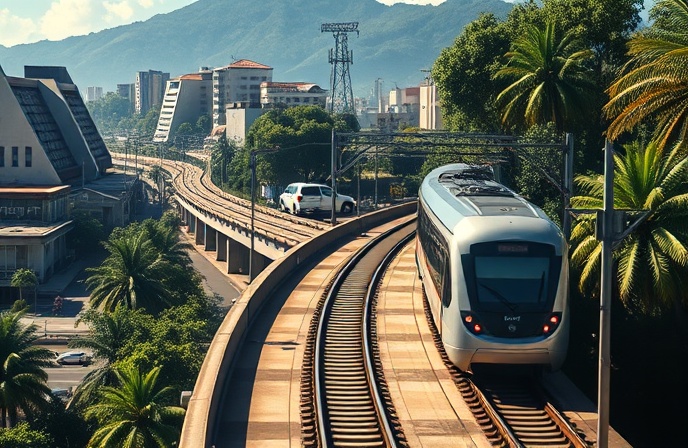AZER-BLET Pact: Rail Labor & Efficiency Boost in Arizona
Arizona Eastern Railway and BLET reach tentative labor deal. First union contract, boosting worker rights and safety.

“`html
Arizona Eastern Railway and BLET Reach Tentative First Contract Agreement
In a landmark development for rail labor relations, the Brotherhood of Locomotive Engineers and Trainmen (BLET) has reached a tentative five-year labor agreement with the Arizona Eastern Railway (AZER). This pivotal agreement, pending ratification by BLET members, marks the first union contract in AZER’s history, significantly altering the landscape of worker rights and operational procedures. The agreement, reached in late July 2024, comes after AZER employees voted to join BLET in June of this year. Located in Arizona, AZER, owned by Genesee & Wyoming Inc., operates on 206 miles of track. This article will explore the key provisions of the tentative agreement, examining its impact on AZER’s workforce and its implications for the broader freight rail industry, including how this agreement was formed.
Key Provisions of the Tentative Agreement
The core of the proposed contract focuses on establishing fundamental worker protections and enhancing operational efficiency. The agreement meticulously lays out a seniority roster, complete with provisions for prior rights, ensuring established employees retain their standing. Comprehensive grievance procedures are outlined to address workplace disputes, and the union has secured protection for its members against unjust discipline. Beyond these foundational elements, the contract introduces guaranteed work weeks and defined rest days, addressing a significant concern regarding work-life balance for operating crews. The agreement also encompasses new promotional pathways for engineers, promising a more structured and transparent system, and a formalized training process to bolster skill development. Furthermore, the contract provides paid personal time off and incorporates provisions for safety improvements, reflecting the union’s focus on worker well-being and operational safety. Finally, the contract includes wage increases and a signing bonus to provide improved compensation to AZER employees.
Enhanced Worker Protections: Seniority and Grievance Procedures
The establishment of a formal seniority system is a critical component of the tentative agreement. This system ensures that experienced employees retain their positions and privileges during times of operational adjustments, protecting their established rights and benefits. Beyond the establishment of the seniority roster, the agreement details a formal grievance procedure. This procedure offers a structured process for employees to address workplace concerns, including disciplinary actions or alleged contract violations. These formal procedures offer a clear path for resolving disputes and promote fairness, crucial elements for a stable and productive labor environment. The integration of these worker protections demonstrates BLET’s commitment to securing a favorable environment for its members on AZER.
Engineering and Training: Fostering a Skilled Workforce
The tentative agreement also addresses the career development of engineering staff. A new promotional process for engineers is included in the contract, establishing transparent pathways to higher positions and fostering career advancement opportunities for qualified employees. Moreover, the introduction of a formal training process is a pivotal addition. This training initiative underscores the importance of continuous skill development, ensuring that engineers are adequately prepared for the demands of the evolving railway industry. These commitments signify a mutual investment in the workforce’s long-term growth and the railroad’s operational excellence, allowing AZER to benefit from a fully trained and invested staff.
Financial and Safety Enhancements
The agreement goes beyond basic worker rights by offering concrete financial and safety benefits. General wage increases and a signing bonus are included in the contract, directly improving the financial well-being of employees. Furthermore, the agreement includes specific safety improvements, demonstrating a commitment to ensuring a safe working environment. These safety improvements are crucial to reducing the risk of accidents and injuries. The inclusion of financial and safety measures solidifies the agreement as a benefit to all stakeholders involved.
Conclusion
The tentative agreement between the Brotherhood of Locomotive Engineers and Trainmen and the Arizona Eastern Railway represents a significant milestone in the relationship between labor and management within the freight rail sector. If ratified, the contract will institute crucial safeguards for AZER employees, including established seniority rights, grievance procedures, and protections against disciplinary action. The focus on guaranteed work weeks, structured engineer promotion, and comprehensive training programs points to a forward-thinking approach, aligning with modern labor practices. The inclusion of both wage increases and specific safety improvements further reinforces the agreement’s commitment to improving the overall working conditions and financial security of the AZER workforce. This agreement serves as a model for negotiations within the industry, potentially influencing future agreements with other regional or short-line railroads. The successful implementation of this contract will be watched closely, with potential ramifications for industry standards, workforce relations, and ultimately, the operational efficiency of the entire railroad network.
Company Summary: Genesee & Wyoming Inc. (G&W) and Arizona Eastern Railway
Genesee & Wyoming Inc. (G&W) is a major player in the North American and international freight rail industry, operating a substantial network of short-line and regional railroads. The company, headquartered in Darien, Connecticut, provides rail freight services to a diverse range of industries including agriculture, manufacturing, and natural resources. G&W’s operational model often involves acquiring and efficiently managing regional and short-line railroads to provide crucial “last-mile” service, connecting customers to the larger Class I railroads. Arizona Eastern Railway (AZER) is a short-line railroad and a subsidiary of Genesee & Wyoming, operating on 206 miles of track in Arizona, providing freight services and interchanging with the Union Pacific Railroad. The agreement signed with BLET is an example of G&W’s ongoing commitment to developing strong working relationships with its labor force to improve overall operational efficiency.
“`




